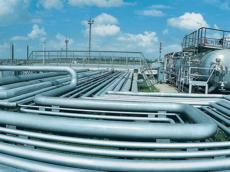|
|
TODAY.AZ / Analytics
Turkmenistan one step closer to Trans-Caspian pipeline
01 July 2015 [11:56] - TODAY.AZ

By Aynur Karimova
Turkmenistan is one step closer to the implementation of the long-awaited Trans-Caspian gas pipeline, widely regarded as the optimal option to deliver Turkmen blue fuel under the Caspian through Azerbaijan to European consumers.
The project comes closer to being realized after the parliaments of Turkmenistan and Kazakhstan ratified a bilateral agreement on the division of the Caspian Sea between the two Central Asian countries.
The construction of the 300 kilometer-long Trans-Caspian Pipeline is of strategic interest to the EU, Turkmenistan and Azerbaijan. Europe seeks to decrease its dependence on Russian gas, while Turkmenistan aims to diversify its gas supply routes, as well as create an additional guarantee for the reliable and stable export of energy resources to international markets. Meanwhile, Azerbaijan is interested in the huge benefits of transporting Turkmen gas via its territory.
The negotiations between the EU, Azerbaijan, and Turkmenistan on the Trans-Caspian gas pipeline began in September 2011 and accelerated after the Ukraine crisis. When the European Union began to impose sanctions against Russia, Malena Mard, head of the EU delegation to Azerbaijan expressed the EU's interest in the implementation of the pipeline and called the project “a good opportunity to diversify energy supplies.”
The unresolved status of the Caspian Sea, however, has been regarded as the main factor hindering the implementation of the project.
By signing the agreement on the delimitation of their maritime border in the Caspian Sea with neighboring Kazakhstan, Turkmenistan showed the international community that its national sectors of the Caspian Sea are de facto recognized.
Iran will win by joining Trans-Caspian
Turkmenistan's desire to bring about the Trans-Caspian Pipeline has prompted isolated Iran into action. Following the EU's interest in diversifying its energy supply routes, Iran has repeatedly offered its territory as a potential route for gas transportation to Europe.
The Islamic Republic, which sits on 34 trillion cubic meters of gas, accounts for 18 percent of the world’s total and largest reserves, putting the country ahead of Russia and Qatar. Iran hopes to enjoy new business and investment opportunities after the nuclear talks with the six world powers near an end.
Europe is heavily dependent on energy imports and is striving to reduce its energy reliance on Russia and keeping the possibility of importing gas from Iran open.
Iran stands ready to resume its gas exports to Europe in case the international sanctions imposed against it are lifted. Iranian officials said the Islamic Republic could serve as a reliable and steady source of natural gas to Europe.
Iran desires to be the regional hub for energy trade and a bridge for Central Asian and Azerbaijani energy exports to European markets.
Thus by joining the Trans-Caspian Pipeline, Iran will escape a long-term blockade and become Europe’s necessary strategic partner in gas supply.
URL: http://www.today.az/news/analytics/141852.html
 Print version
Print version
Connect with us. Get latest news and updates.
See Also
- 18 April 2025 [20:14]
Armenia’s “Crossroads of Peace” lacks substance to deliver regional integration - 18 April 2025 [13:58]
Truth hurts: Armenian media panics after FM’s sovereignty slip-up - 16 April 2025 [19:00]
Baku, Tbilisi: Strategic partners at crossroads of Eurasia - 16 April 2025 [14:42]
Yerevan conceals diplomatic trap for Baku behind peace push - 15 April 2025 [20:12]
Azerbaijan drives strategic transformation of Turkic Council amid global shifts - 14 April 2025 [08:30]
South Caucasus peace paves way for deeper EU–Central Asia integration - 13 April 2025 [13:56]
Armenian FM struggles to defend his country’s constitution - 12 April 2025 [15:15]
Azerbaijan’s strategic role in shifting global order: Deputy Gafarov weighs in - 10 April 2025 [08:30]
President Aliyev's address sets clear message to Armenia on peace at impasse - 09 April 2025 [13:11]
From crisis to cooperation: Azerbaijan’s role in Turkiye-Israel rapprochement
Most Popular
 Antalya Diplomacy Forum becomes center of global dialogue
Antalya Diplomacy Forum becomes center of global dialogue
 The "parallel" worlds of Armenia
The "parallel" worlds of Armenia
 Separatists & Pashinyan - the farce continues
Separatists & Pashinyan - the farce continues
 4SIM signs MoUs with Chinese institutions to boost cooperation in green and industrial technologies
4SIM signs MoUs with Chinese institutions to boost cooperation in green and industrial technologies
 Azerbaijani and Georgian Presidents hold expanded meeting over luncheon
Azerbaijani and Georgian Presidents hold expanded meeting over luncheon
 A fat, nosy and bald hint that Armenia will remove claims against Azerbaijan from the Constitution
A fat, nosy and bald hint that Armenia will remove claims against Azerbaijan from the Constitution
 Foreign diplomats tour liberated cities of Khankendi and Shusha
Foreign diplomats tour liberated cities of Khankendi and Shusha
